义人的祷告 Prayer of a righteous person
Clarification 1

What does the word “Hamas” (哈马斯) mean?

Hamas comes from the Arabic name of the Suni Islamic organisation “Islamic Resistance Movement.” The name was shortened to the acronym HMS, which became the Arabic word Hamas in the Hamas Covenant. See Wikipedia article here if you’re interested. There’s also a good article here on PBS News Hour about Hamas). The Arabic word Hamas itself means zeal, strength, or bravery.
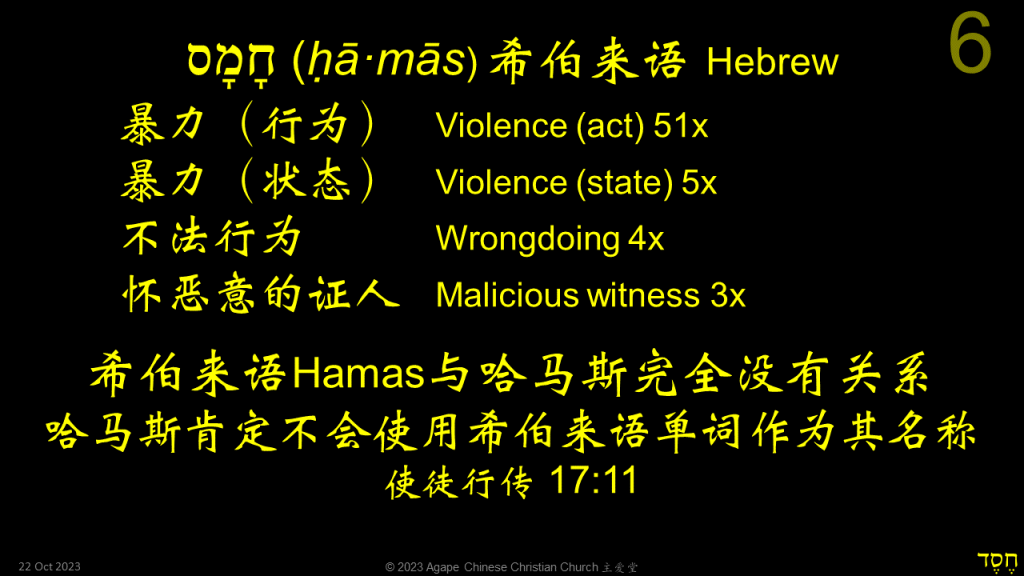
I saw a YT video last week (you can watch the video here, it’s entirely in Chinese) where someone said Hamas means “violence,” and it’s the Hebrew word חָמָס (ḥā·mās), which means violence. In the Bible, חָמָס appeared first in Gen 6:11, where it said “the earth was filled with violence.” The person in the video said the evil spirits of violence described at the beginning of Gen 6 has entered into Hamas (the organisation), and that’s why they’re such a violent group.
The Hebrew word Hamas appeared 63x in the OT, with the most common meaning of violence. But, other than having very similar pronunciations with the Arabic Hamas (they’re not identical), they have nothing to do with each other!
Can you imagine an anti-Semitic organisation, bent on the eradication of all Jews, using a Hebrew word as the organisation’s name?
We should be like the Bereans (the Jews in Berea, see Acts 17:10–11), who searched the OT daily to see if what Paul and Silas told them were true. The Beareans were checking up on Paul and Silas, we should certainly do the same with other preachers (or online videos).
Clarification 2

What’s the difference between jealousy and envy? Are they synonyms?
I’ve always thought 嫉妒 meant jealousy, but I found out a few days ago (while preparing today’s sermon) that the proper term for jealousy is 忌邪!
I have to thank Ma Li (Vic’s mom) for pointing this out to me last Sunday.

Comparing jealousy and envy.
Jealousy (忌邪) is when you want to keep or protect what rightly belongs to you. E.g., if your husband goes on a date with another woman, you’ll be jealous, because only you (the wife) are allowed to go on dates with your husband.
Envy (嫉妒) is slightly different. Envy is wanting something that doesn’t belong to you. E.g., you see you friend’s new shinny laptop, and you want it. That’s envy; the laptop doesn’t belong to you. We often mix up envy and jealousy (at least in common English usage).
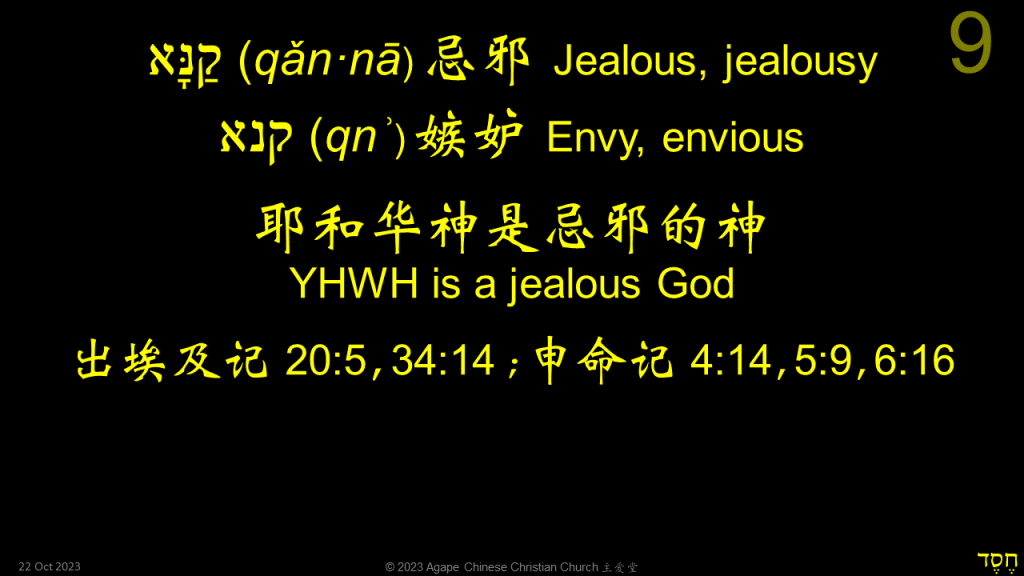
In the OT, “jealous” (忌邪) appears only 6x: Exodus 20:5; Exodus 34:14 (2x); Deut 4:24; Deut 5:9; Deut 6:15. All six appearances describe God: God is a jealous God!
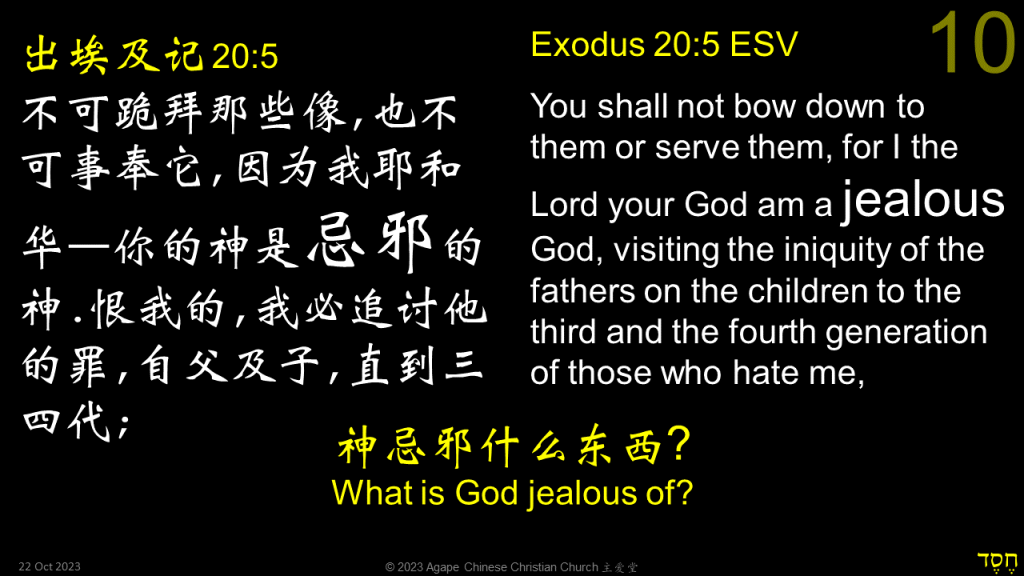
Sample passage from Exo 20:5. What is God jealous of?
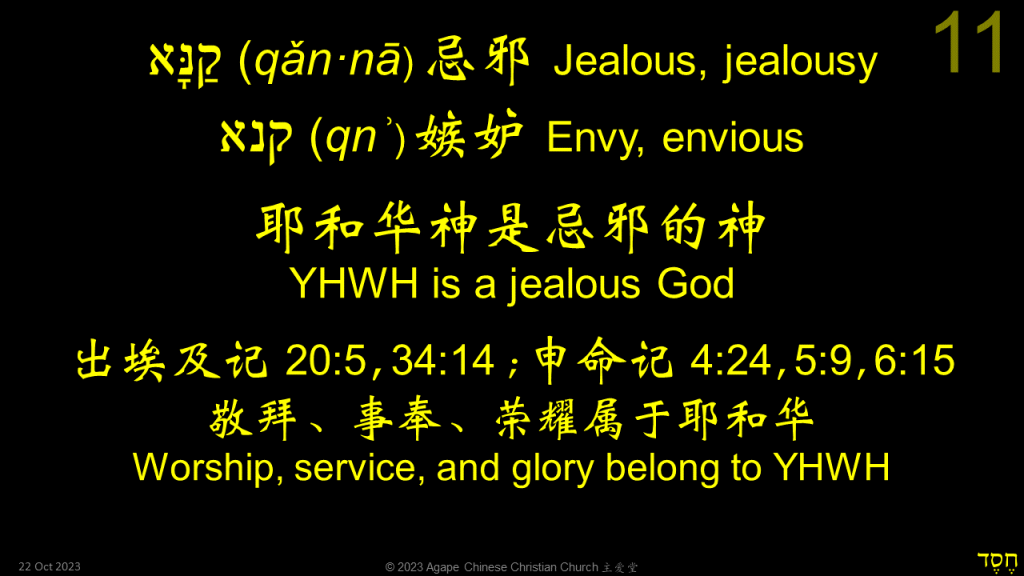
Worship, service, glory all belong to YHWH alone. If we give these things to someone else (or something else), we’re giving away what belongs to YHWH alone:
- When we worship an idol (Christians treating famous pastors like idols)
- When we let something become more important than God (like our studies, money, work, …)
- When we give someone else (especially ourselves) the glory that belongs to God (“See how talented I am!” “See how great a Bible teacher I am!”)
That’s why he’s jealous.
Hook

What do we know about Elijah?
He was one of the great OT prophets. There is a book with his name (like Isaiah or Daniel), but he is considered a “superman” prophet.
What would you think if someone tells you, “You are like Elijah!”
Are you a righteous person?
Many Christians might not think of themselves as righteous, but in fact, we are. We are righteous not by our own efforts, but by Jesus’ righteousness imputed to us. We believed in Christ, and God counts us as righteous.
Passage
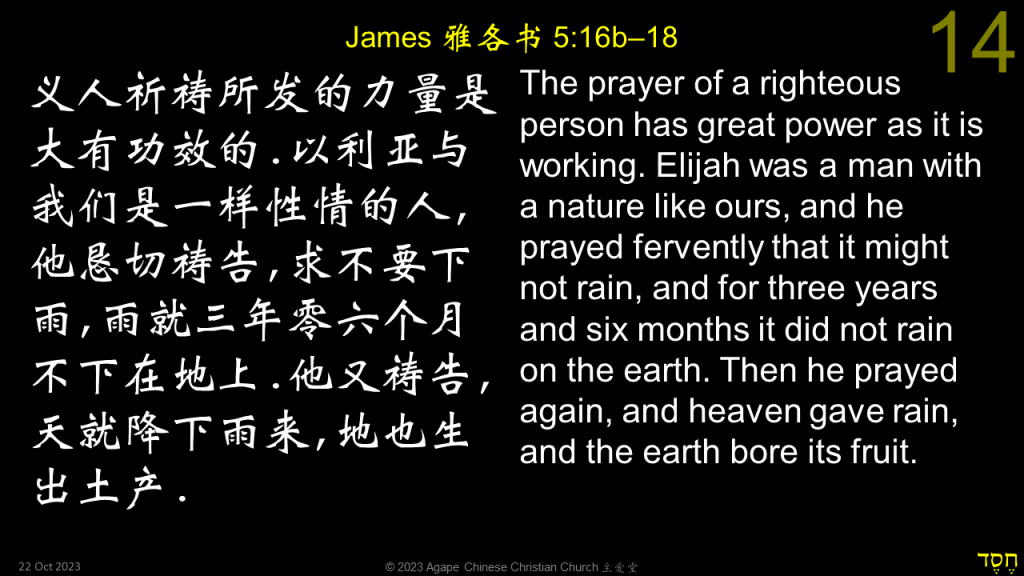
Outline
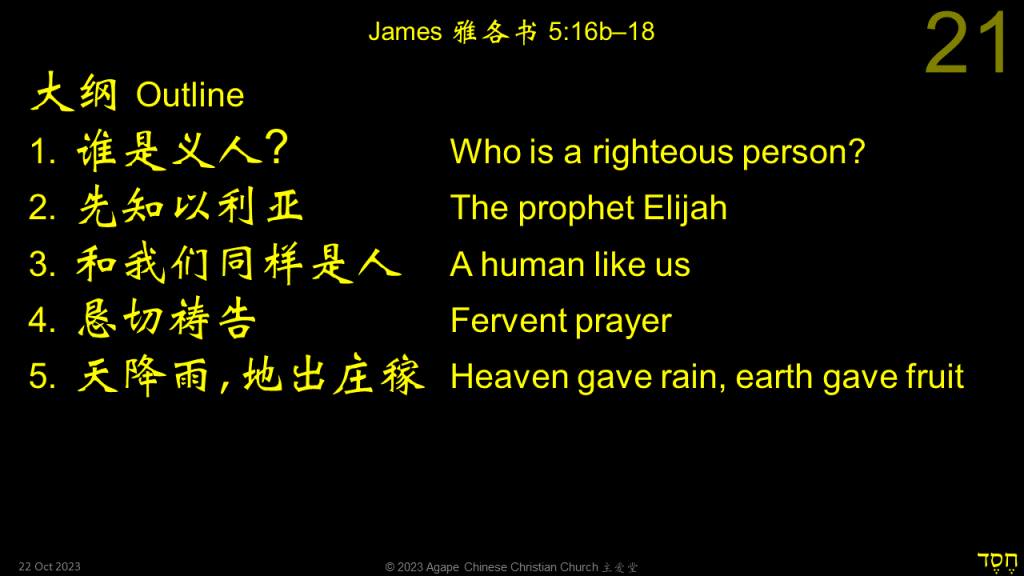
Section 1
Passage

A righteous person
Romans 3 tells us no one is righteous, not one. But this is not the definition that James has in mind. His example of Elijah (and saying he’s human just like us) shows that we’re not talking about being sinless. Elijah was also a sinner (just like us), but James calls him a righteous man.
Righteous translates the Greek word δίκαιοςa. A Greek dictionary (Greek-English Lexicon of the New Testament based on Semantic Domains, 1996) gives this definition:
δίκαιοςa, α, ον: pertaining to being in accordance with what God requires—‘righteous, just.
Like in Matt 1:19, “…Joseph was a righteous man” (“约瑟是个义人” The ESV translates it as “a just man”).
In the Chinese version of the dictionary (Brannan, Rick, ed. 莱克姆新约希腊文字典. Bellingham, WA: Lexham Press, 2020.), it has:
“公义的人 — 以公义的行为和道德为特征的人”
Highly effective
A righteous person’s prayer is highly effective.
Note that James didn’t say some spiritual superstar or someone with great praying abilities, but just any righteous person. You and I, being righteous through Jesus, our prayers are also highly effective.
Why is it effective? Because a righteous has already discerned God’s guidance. Her prayer will be according to God’s will. When we pray that way, our prayers will be effective.

Lessons
- Because of faith in Jesus Christ, all Christians are declared righteous. We are the righteous person that James is talking about.
- A righteous person is in tune with God’s heart. He seeks God’s heart and will. She prays according to God’s will.
- Thus, this type of prayer is very effective. It has great power, provided by the Holy Spirit.
- Will you be such a righteous person?
Section 2
Passage

You can read Elijah’s exploits in 1 Kings 17–19. There’s a bit of intermission from 1 Kings 20–22, then it picks up again in 2 Kings 1:1–2:18.
Many of us have heard of these stories and probably stood in awe of all the miracles Elijah performed.
So how are we like Elijah? We’re not spiritual superstars, we can’t do any miracles.
Despite Elijah’s spectacular powers, he also has fear and depression, just like us.
His prayers are also very simple and easy to understand. Here are two examples.

This drawing shows the contest between Elijah and Baal’s prophets. Elijah has faith in YHWH, while Baal’s prophets believe in the false god Baal. Of course, YHWH is the true God, as Elijah so convincingly showed the Israelites (the latter were worshiping Baal as well).
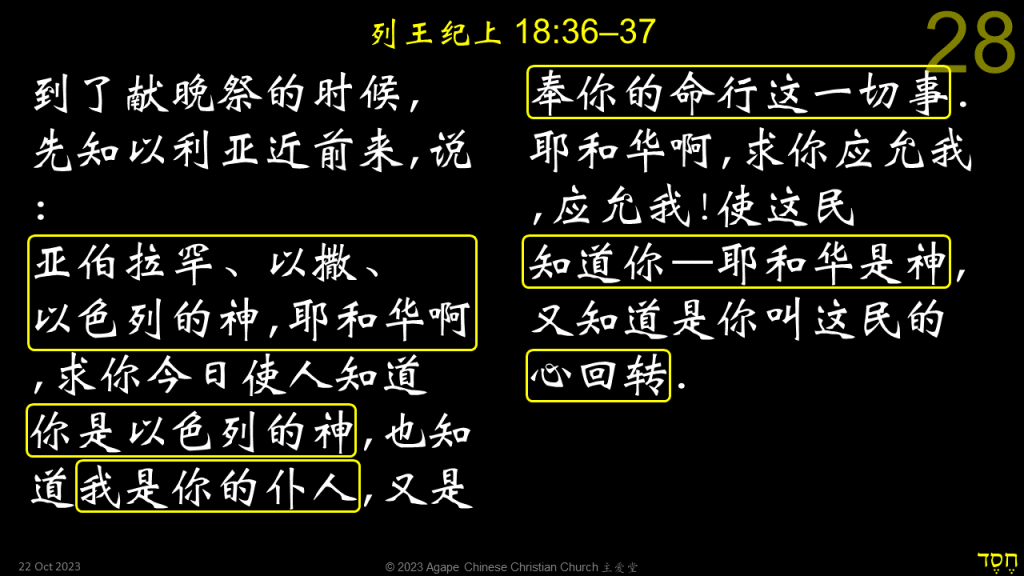
1 Kings 18:36–37 ESV
And at the time of the offering of the oblation, Elijah the prophet came near and said, “O Lord, God of Abraham, Isaac, and Israel, let it be known this day that you are God in Israel, and that I am your servant, and that I have done all these things at your word. Answer me, O Lord, answer me, that this people may know that you, O Lord, are God, and that you have turned their hearts back.”
In this prayer, Elijah acknowledges who YHWH is:
- YHWH is the God of Abraham, Isaac, and Israel (Jacob)
- YHWH is God, no one else
- Elijah is God’s servant (as are all of us), and we serve only God
- YHWH will answer Elijah not to show how great or powerful a prophet Elijah is, but to let the people know that YHWH is God, and to turn the Israelites back to worshipping YHWH
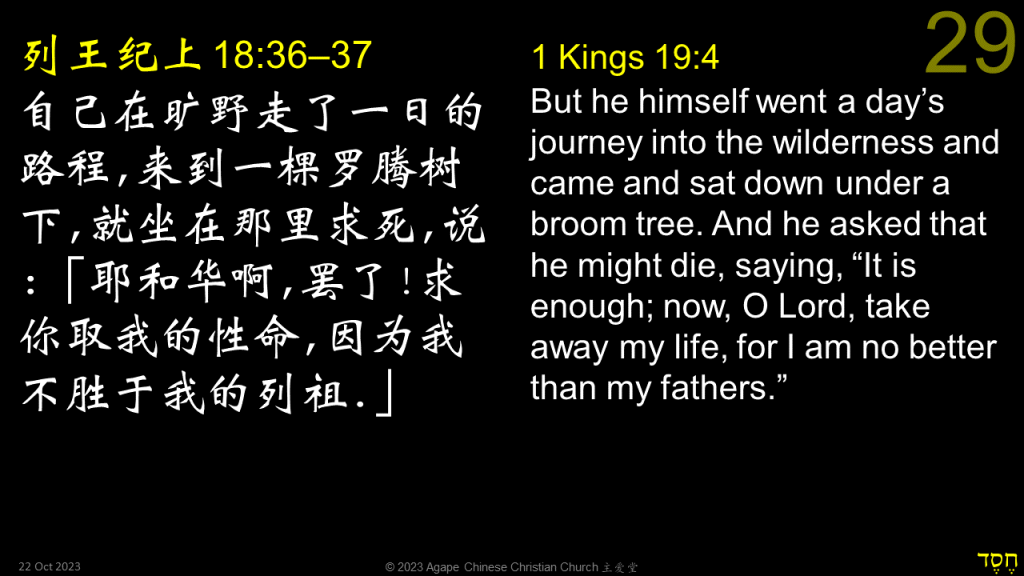
In this passage, Elijah just finished the famous contest with the Baal prophets at Mount Carmel (1 Kings 18:16–46), showing that YHWH is indeed the God that controls not just the weather, but life and death. YHWH is God, Baal is not. Here is a study-note from the NET Bible (New English Translation, my preferred translation):
This episode is especially significant in light of Ahab’s decision to promote Baal worship in Israel. In Canaanite mythology the drought that swept over the region (v. 1) would signal that Baal, a fertility god responsible for providing food for his subjects, had been defeated by the god of death and was imprisoned in the underworld. While Baal was overcome by death and unable to function like a king, Israel’s God demonstrated his sovereignty and superiority to death by providing food for a widow and restoring life to her son. And he did it all in Sidonian territory, Baal’s back yard, as it were. The episode demonstrates that Israel’s God, not Baal, is the true king who provides food and controls life and death. This polemic against Baalism reaches its climax in the next chapter, when the LORD proves that he, not Baal, controls the elements of the storm and determines when the rains will fall.
After winning the contest and killing all of Baal’s prophets, queen Jezebel threatened to kill him (1 Kings 19:2). Elijah was so afraid (1 Kings 19:3) that he ran and hid in the wilderness, praying to God to take his life (1 Kings 19:4). Note that he’s not committing suicide; he said he’s had enough, and is asking God to kill him.
So just like us, there are great moments of strength and faith, and depressing moments of fear and despair. He is a human like us!

Lessons
- Elijah is a righteous person.
- The focus of Elijah’s prayers is on God and God’s glory.
- Elijah has moments of great strength and faith, but he also has moments of great fear and despair.
- He is human like us!
Section 3
Passage

This verse (James 5:17a) is the focal point of today’s passage.
一样性情 (“like,” “similar”) Whatever Elijah was, we are just like him.
一样性情 translates the single Greek word ὁμοιοπαθὴς. The only other time it appears in the NT is Acts 14:15, when Paul and Barnabas told the people of Lystra that they are humans just like them, and shouldn’t be treated like gods.
How are we similar to Elijah? We are not be able to make a bit of flour and oil (1 Kings 17:12, 17:14) last for years, bring someone back from the dead, or call down fire from heaven. But James says that Elijah is a human like us. How can that be?
我们与以利亚有何 相似 之处?
How are we similar to Elijah?
Because God sees us as righteous, just like Elijah was.
Because of that, our prayers are also effective (James 5:16b), just like Elijah.
Lessons
Section 4
Passage

The phrase “he prayed fervently” (他恳切祷告 James 5:17) in Greek is “he prayed a prayer.” This is just an idiom meaning he prayed fervently, earnestly, sincerely.
As we saw earlier, there’s nothing in his prayers that are superhuman or show any great power of a super prophet.
So in the matter or prayers, he is just like us. Or, we’re just like him. And
Lessons
Section 5
Passage

A righteous person’s prayer “has great power as it is working” (James 16b).
We can say such prayers are highly effective.
Where does this power come from?
The Holy Spirit!

Let’s look at another sample prayer:
- Who prayed this?
- Was he successful? Did God listen to his prayer? We can answer both “No” and “Yes.”
- “No” because he asked for the cup to be removed, and of course, God didn’t remove it (Jesus took the sins of humanity on himself and died for us)
- “Yes” because he prayed according to God’s will. When we pray according to God’s will, we can be sure God will answer
Lessons
Final Lessons

Lessons
- Elijah experienced incredible things, performed many miracles, was even taken away by God in a fiery chariot (2 Kings 2:10). But he’s just like us. “There is nothing beyond the power of God, which is available to the one who prays earnestly.” (TTCS)
- Elijah was a righteous person, so are we.
- A righteous is close to God’s heart, knows what God wants. Thus, a righteous person’s prayer is highly effective and powerful.
- We don’t need flowery or long prayers, just earnest prayers.
- We’ll have prayer meeting after worship. Let’s pray like Elijah.
Instead of only asking things for ourselves,
let’s pray for others,
for the church,
for our city, country, world. - Let’s also pray like Elijah every day, not just in prayer meetings.
